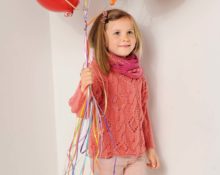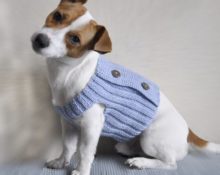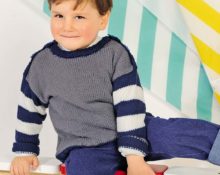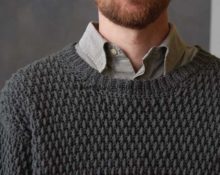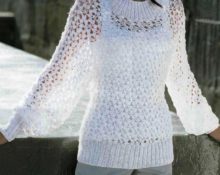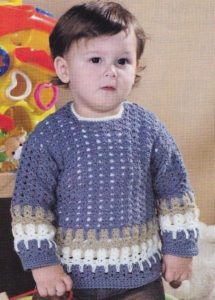 Bomber, pullover, cardigan, sweatshirt... How not to get lost in the terms denoting a warm knitted sweater, familiar from childhood? The most familiar and close option is a sweater.
Bomber, pullover, cardigan, sweatshirt... How not to get lost in the terms denoting a warm knitted sweater, familiar from childhood? The most familiar and close option is a sweater.
Sweater - these are clothes knitted from warm yarn, without fasteners. This word comes from the English adverb: “sweater” from the verb “to sweat” - to sweat.
How to crochet a baby sweater?
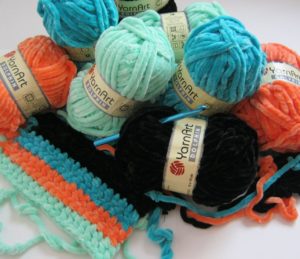 If you decide to knit a sweater for your baby, you need to decide on several points:
If you decide to knit a sweater for your baby, you need to decide on several points:
Compound. For a children's sweater, yarn of a natural composition is suitable; it can be cotton threads, woolen threads or yarn containing flax. It is not recommended to give preference to acrylic, synthetic and viscose compositions.
You need to choose a knitting pattern.
Pay attention to the simple design, which is not oversaturated with complex patterns and ornate weaves.
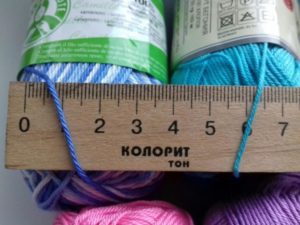 Alternating stitches with and without double crochets, diluted with air loops, is suitable.
Alternating stitches with and without double crochets, diluted with air loops, is suitable.
Colors for a boy
The color range for boys extends far beyond the standard blue.
 The following combinations look most advantageous on sweaters: yellow-gray, gray-blue, brown-blue, yellow-green.
The following combinations look most advantageous on sweaters: yellow-gray, gray-blue, brown-blue, yellow-green.
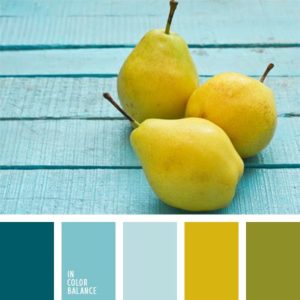 These natural shades fit harmoniously into any style of children's wardrobe.
These natural shades fit harmoniously into any style of children's wardrobe.
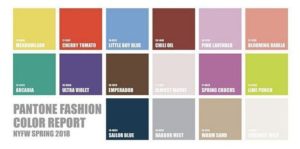
Fashionable shades 2018-2019
Stick to a calm tone, avoiding “acid” colors.
Important! The main thing is to choose what to focus on, whether it will be a harmonious combination of colors in the same key or a play of “bright-light” contrasts.
Pattern for knitting a children's sweater
If you do not have experience as a cutter, you can simplify this point, and take a child’s existing T-shirt or sweater and knit the front and back, focusing on it.
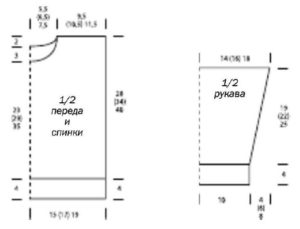
A simple pattern for a turtleneck sweater for a boy
To get a more accurate fit, you should understand the algorithm for taking measurements and creating a pattern.
Arm yourself with a measuring tape, a notepad for notes, and also a sheet of Whatman paper on which you will build a pattern for the boy.
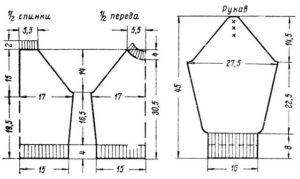
Pattern for a children's sweater with raglan sleeves
As a starting point, tie a ribbon or string around your baby's waist.
- Chest circumference - measured 10-12 centimeters below the armpit.
- Waist: over lace.
- Front shelf length: from the top of the shoulder through the protruding point on the chest to the desired length.
- Back length: from the seventh cervical vertebra of the desired length.
- Shoulder length: from the base of the neck to the shoulder.
- Sleeve length: slightly bending the child’s arm, measure from the shoulder, through the elbow to the wrist.
- Upper arm circumference: across the widest part of the arm.
- Neck circumference: at the base of the boy's neck.
We transfer the obtained measurements onto paper, lining up three parts: front shelf, back, sleeve.
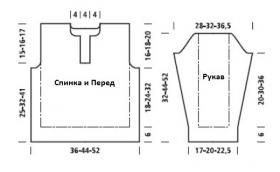
Sweater pattern with a small slit in the front (with a zipper)
For the first knitted work, it is better to knit the sleeves with a rectangular fabric, based on calculations, in this case, even when knitting fronts, you won’t have to be particularly “tricky” and knit the armhole, As a result, the sleeves will turn out to be slightly deflated during work.
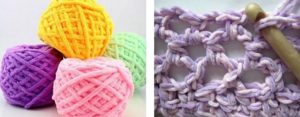
Important! In order to calculate how many loops are required, you need to knit an example. To do this, we take the selected yarn and the knitting pattern according to which we will knit. We collect a chain of air loops, about 10 centimeters long. Next, we begin to knit the pattern and knit 10-15 centimeters.
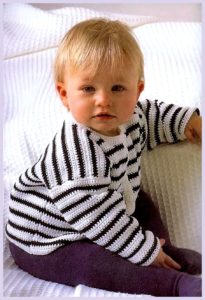 We take a centimeter ruler and measure how many centimeters the drawing is from start to finish, i.e. before the next repetition (rapport).
We take a centimeter ruler and measure how many centimeters the drawing is from start to finish, i.e. before the next repetition (rapport).
It is recommended to knit from the back, so we divide the hip circumference by 2 (front and back).
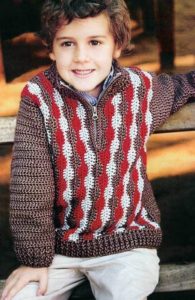 We divide this figure by the number of repeats, add a couple of edge stitches and here we have the desired result; this is the number of loops you should cast when choosing a specific yarn and a specific pattern.
We divide this figure by the number of repeats, add a couple of edge stitches and here we have the desired result; this is the number of loops you should cast when choosing a specific yarn and a specific pattern.
Stages of work
For beginner craftswomen, it is better to take the simplest patterns. Working according to the diagram is much easier than reading the description in text.
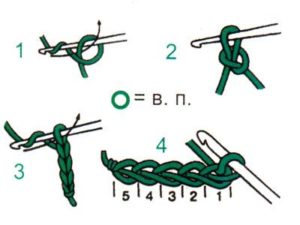
Where to start crocheting?
The most enjoyable part remains – the process of knitting the parts. For the first work, the following pattern is perfect: dc, 4 ch, 2 dc, 4 ch, 1 dc, 4 ch, 2 dc, 2 v. p., 2 dc, 4 vp. Do the required number of repetitions.
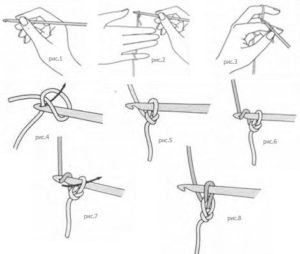
How to crochet stitches?
Having knitted the fabric from the bottom to the required height, you need to knit the neckline. To do this, we find the center of the product, and set aside a quarter of the neck girth measurement from it, make a mark (you can pin it).
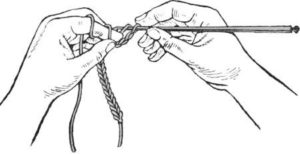
1st row crochet
We start knitting a row, reach the pin and turn the knitted fabric and knit in the opposite direction, focusing on the pattern.
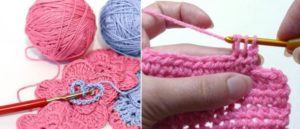
Crochet
In the next row, when you reach the pin, you need to make a decrease, how sharp it will be depends on the neckline.
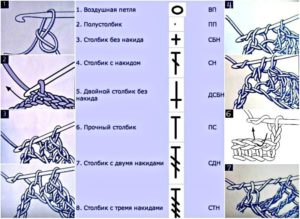
Designations of loops and how to crochet them
Crochet is distinguished by its maneuverability, and even if the neckline turns out to be too sharp, you can crochet it in several rows and make it more rounded. We proceed in the same way with the second side.
Attention! When crocheting a sweater, it is better to knit the elastic at the cuffs and along the bottom of the product with knitting needles, so it will be more flexible and will not stretch.
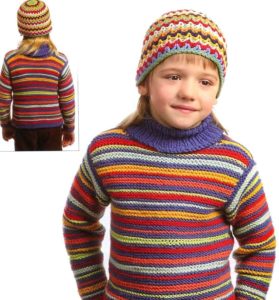 Once all the details are ready, you need to rinse them in cool water, dry them horizontally on a large towel and you can assemble the sweater. We fold the parts according to the diagram: front with back, sleeves in half, tie them at the edges with single crochets.
Once all the details are ready, you need to rinse them in cool water, dry them horizontally on a large towel and you can assemble the sweater. We fold the parts according to the diagram: front with back, sleeves in half, tie them at the edges with single crochets.
Important! The details of the sweater can be sewn with a large needle and strong thread, so the seam will be less rough.
Then we sew the sleeves to the armholes, that is, starting from the top of the knitted fabrics: the back and the front front. We sew elastic to the cuffs and along the bottom of the product and you can try it on for a little fashionista!
Easy crochet patterns:
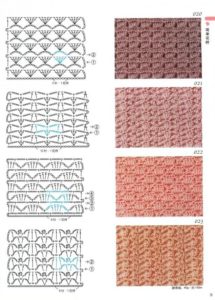
Dense patterns, crochet patterns
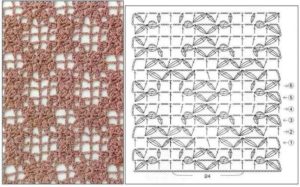
Crochet pattern “Diamonds”
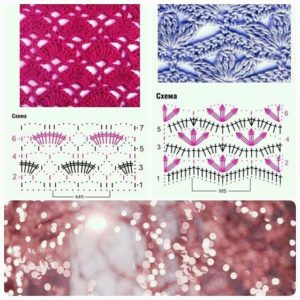
Original patterns for hooks (fans)
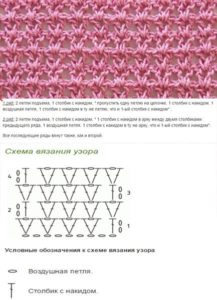
Easy pattern for a baby sweater
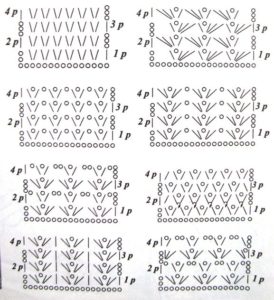
Simple crochet patterns
Having mastered knitting for kids, you will be able to create original things not only for children, but also for adults! And by choosing different color combinations, yarn textures and knitting patterns, you will create a unique wardrobe!


 0
0